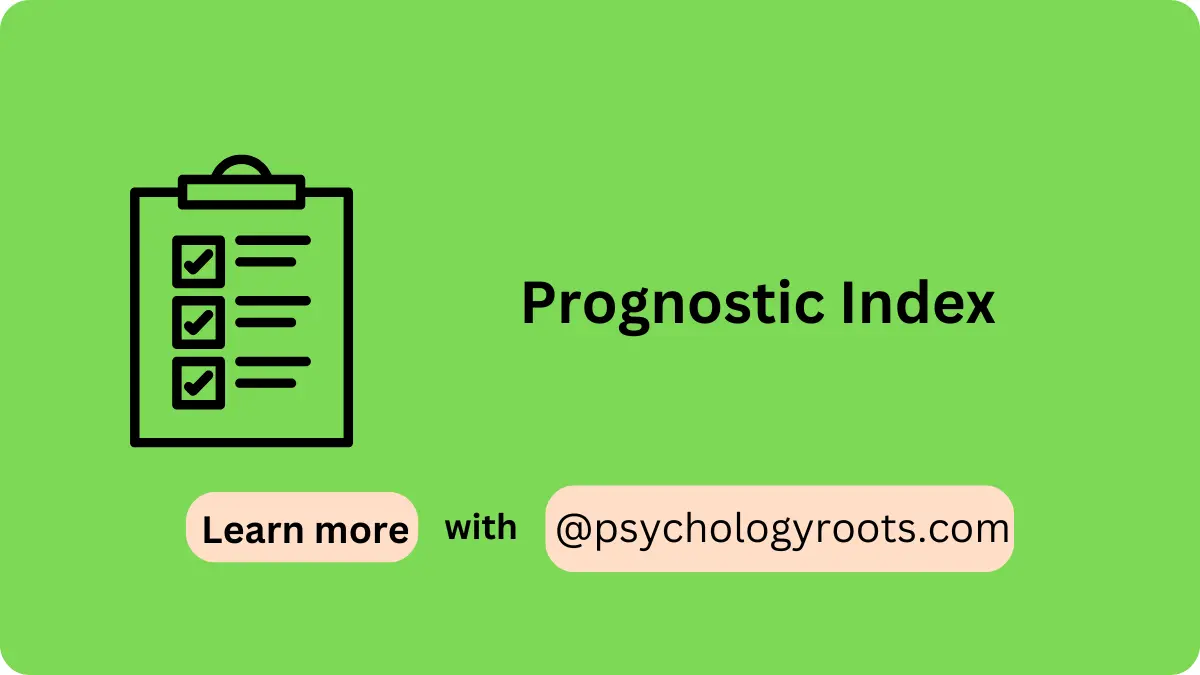Table of Contents
Prognostic Index
Here in this post, we are sharing the “Prognostic Index”. You can read psychometric and Author information. We have thousands of Scales and questionnaires in our collection (See Scales and Questionnaires). You can demand us any scale and questionnaires related to psychology through our community, and we will provide you with a short time. Keep visiting Psychology Roots.
About Prognostic Index
Scale Name
Prognostic Index
Author Details
Sei J. Lee, MD, Karla Lindquist, MS; Mark R. Segal, PhD; Kenneth E. Covinsky
Translation Availability
Not Sure

Background/Description
The Prognostic Index is a clinical tool designed to predict patient outcomes, such as the likelihood of disease progression, survival rates, and recurrence risks, by incorporating various clinical, pathological, and demographic factors. Originally developed within oncology settings, it has since been adapted to assist in predicting outcomes across various health conditions. The index helps healthcare professionals make informed treatment decisions by providing an evidence-based estimation of prognosis, which can guide both medical interventions and patient counseling.
For example, the Prognostic Index for penile squamous cell carcinoma, introduced by Chaux et al., predicts the risk of nodal metastasis and overall survival, using factors like tumor size and histological grade. Additionally, Lee et al. developed a Prognostic Index for mortality in older adults, which takes into account age, health status, and other risk factors.
Administration, Scoring and Interpretation
- Collect relevant data based on the specific type of Prognostic Index. For oncological indices, such as for penile cancer, include tumor pathology details. For broader indices like mortality in older adults, consider age, co-morbidities, and overall functional status.
- Each index has its own scoring criteria. Based on specific patient attributes, assign values to each criterion, which may range from tumor size to patient age or existing health conditions.
Reliability and Validity
- Reliability: The reliability of Prognostic Indices depends on accurate data collection and adherence to the index’s guidelines. Proper training and consistency in the scoring process can enhance reliability.
- Validity: These indices have undergone extensive validation. Chaux et al. validated the prognostic index for penile squamous cell carcinoma, demonstrating accuracy in predicting metastasis and survival. Similarly, Lee et al. validated their mortality index among older adults across diverse populations, confirming its practical application.
Available Versions
Multiple-Items
Reference
Lee, S. J., Lindquist, K., Segal, M. R., & Covinsky, K. E. (2006). Development and validation of a prognostic index for 4-year mortality in older adults. Jama, 295(7), 801-808.
Chaux, A., Caballero, C., Soares, F., Guimarães, G. C., Cunha, I. W., Reuter, V., Barreto, J., Rodríguez, I., & Cubilla, A. L. (2009). The prognostic index: a useful pathologic guide for prediction of nodal metastases and survival in penile squamous cell carcinoma. The American journal of surgical pathology, 33(7), 1049–1057. https://doi.org/10.1097/PAS.0b013e31819d17eb
Important Link
Scale File:
Frequently Asked Questions
What is a Prognostic Index?
It is a clinical tool used to estimate a patient’s likely health outcomes based on various risk factors.
Who uses the Prognostic Index?
Primarily healthcare providers use it to make treatment decisions and to counsel patients on expected outcomes.
Can a Prognostic Index be applied to any disease?
There are specific indices for different conditions, but the concept can be adapted to multiple health conditions with validated criteria.
Is the Prognostic Index useful for patient counseling?
Yes, it provides insight into likely outcomes, helping patients and families make informed care decisions.
How often should a Prognostic Index be recalculated?
It depends on the patient’s condition and changes in health status; periodic reassessment may be needed for conditions with fluctuating risks.
Disclaimer
Please note that Psychology Roots does not have the right to grant permission for the use of any psychological scales or assessments listed on its website. To use any scale or assessment, you must obtain permission directly from the author or translator of the tool. Psychology Roots provides information about various tools and their administration procedures, but it is your responsibility to obtain proper permissions before using any scale or assessment. If you need further information about an author’s contact details, please submit a query to the Psychology Roots team.
Help Us Improve This Article
Have you discovered an inaccuracy? We put out great effort to give accurate and scientifically trustworthy information to our readers. Please notify us if you discover any typographical or grammatical errors.
Make a comment. We acknowledge and appreciate your efforts.
Share With Us
If you have any scale or any material related to psychology kindly share it with us at psychologyroots@gmail.com. We help others on behalf of you.